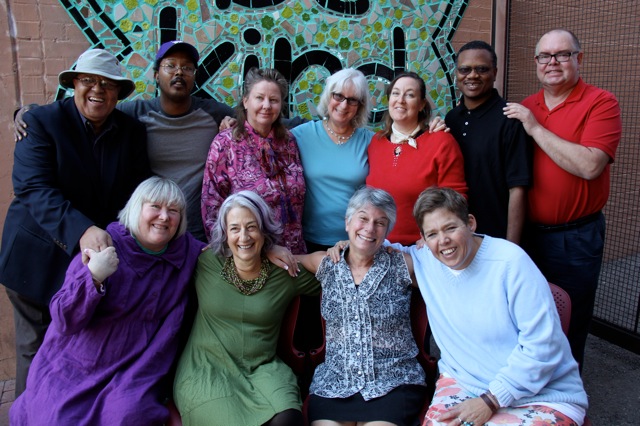In 2012 and 2013, educator Sheila Wilensky led a series of P&W supported workshops at Our Place Clubhouse, a psych-social rehabilitation center in Tucson, Arizona, for adults recovering from serious mental illness. A high school social studies teacher for fifteen years in Vermont and Maine, Wilensky also taught children's literature at College of the Atlantic. From 1982 to 1997, she owned the Oz Children’s Bookstore in Southwest Harbor, Maine. In 2002, she got tired of the ice and snow, drove cross country, and has been living in Tucson ever since. She is currently associate editor of the Arizona Jewish Post. Wilensky blogs about her experience teaching the workshops and produced a chapbook of essays from participants titled, A Certain Slant of Light, which was released earlier this year.

I’ve lived through the civil rights, feminist, and LGBT movements for equality. Now it’s time to reduce the stigma of mental illness in our society. Our Place Clubhouse is a recovery community that encourages self-esteem, and offers job training programs and a safe haven for individuals living with serious mental illness. Around five years ago, I began editing the prolific writing of Rachel and Ira, both of whom struggled with schizophrenia. A week after the January 8, 2011 shooting in Tucson, which killed six people and wounded thirteen, including former U.S. Representative Gabby Giffords, I was meeting with Rachel.
“Why do people think that if you have a mental illness, you may pull out a gun and start shooting at any time?” asked Rachel, throwing her hands up in frustration.
A year later, I had this epiphany: We must change this damaging misconception. Studies indicate that individuals with severe mental illness are more likely to be the victims of violence than the perpetrators.
The Our Place Clubhouse Thursday Writing Group started on September 17, 2012. We sat around a seminar table in the clubhouse boardroom. We talked about our lives. I knew it was important to establish trust.
“We’re going to create a chapbook to help educate the community about living with mental illness,” I told my fourteen prospective coauthors. I’m not sure they believed me.
Writing prompts emerged from our conversations. The first was “any morning:” how to explain to others what a normal day was like for “crazy” people or that group members started their days like anyone else. They fed their pets, brushed their teeth, and some went to work—as pharmacist, baker, artist, peer counselor.
Every week we read our writing aloud with no feedback, judgment, or criticism—listening to individual voices striving for recovery, applauding after each person read. At the end of each session, Doreen, a former middle school language arts teacher, collected the pieces and put them in a folder for me to take home. Our process developed organically, as did my hugging each writer at the conclusion of a session.
I wanted everyone to feel ownership along the road to publication. We brainstormed titles. We peer edited our writing. The section, “What This Chapbook Means to Me,” is a record of the project’s success:
“Participating in this project has been a source of joy and freedom; the freedom to self-express the many faces of mental illness.” —Lani
“Writing this book is an exploration for me. Hearing others’ stories and writing about my own mental illness is invigorating.” —Doreen
“Any one of us can have behavioral disturbances or diseases of the brain. We stigmatize what we don’t understand. Life can be traumatic. I hope that this chapbook has given the reader pause. Let’s stop being afraid of ourselves.” —Pam
“This chapbook is a conversation which expresses our perspectives on lives affected by mental illness.... Most people who live with mental illness and brain disorders are productive in society and contribute a lot to the advancement of the American dream." —Tyrone
Our book launch took place in January 2014. More than two hundred people attended, including the mayor of Tucson.
Thank you to Poets & Writers for giving this project the legitimacy and support my coauthors deserve.
Photo: Sheila Wilensky (wearing green) and Our Place Clubhouse Thursday Writing Group members and staff; credit: Erica von Koerber.
Support for Readings & Workshops events in Tucson is provided by an endowment established with generous contributions from the Poets & Writers Board of Directors and others. Additional support comes from the Friends of Poets & Writers.






